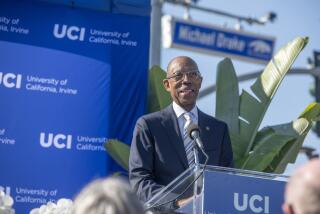Guarding CSU’s dollars
Even a large pay raise for a college president is unlikely to have a noticeable impact on daily campus life. It wouldn’t require an increase in student fees or lead to a significant reduction in the number of courses being offered. But that doesn’t mean presidential pay at California State University is unimportant; a commitment to shared sacrifice is necessary to help everyone power through tough times.
Four months after adopting a controversial policy that allowed new campus presidents a 10% pay increase over what their predecessors had earned, Cal State’s compensation committee will try again on Tuesday. The new policy would freeze publicly funded presidential salaries for the next couple of years, but would allow each campus’ private fundraising foundation to add an unlimited amount for new hires.
Because this wouldn’t cost the state more money, the proposal might quell public protest and legislators’ animosity, but it would make for even worse policy. It might lead to a situation in which a president earned more at a particular campus not because that job was more demanding or because the higher pay was necessary to attract a strong candidate, but because of how active and successful the foundation was at raising money.
Of the several presidential hires to be made in coming months, one is at the California Maritime Academy in Vallejo, which prepares students for careers in the shipping industry. It has been a remarkably successful school, with 99% of its graduates finding immediate employment. Its president must have a substantial background in shipping in addition to the usual credentials in academics and leadership. But the school doesn’t have one of the more active foundations. Will it be forced to hire an underqualified candidate? That could prove far more costly in the long run.
What’s needed isn’t a rigid salary policy but an ongoing practice of watching out for the taxpayer dollar while hiring good campus presidents. That might mean walking away from a top-choice candidate when the third-choice candidate is fully capable and a lot less expensive. Cal State must also do more to groom presidential talent from within its ranks. Even with its 10% ceiling on increases, adopted in January, Cal State immediately went overboard by giving the top possible raise to its next hires, though insiders say it could almost certainly have hired the same people for less money.
Instead of passing more policies that tie their own hands, the trustees should show they can be trusted with public money by approaching each hire conscientiously and responsibly. It would be counterproductive for outsiders — especially politicians — to interfere in academic doings. Yet Cal State must be aware that the Legislature is watching, and that it has shown increasing interest in weakening the authority of trustees it sees as untrustworthy.
More to Read
A cure for the common opinion
Get thought-provoking perspectives with our weekly newsletter.
You may occasionally receive promotional content from the Los Angeles Times.










